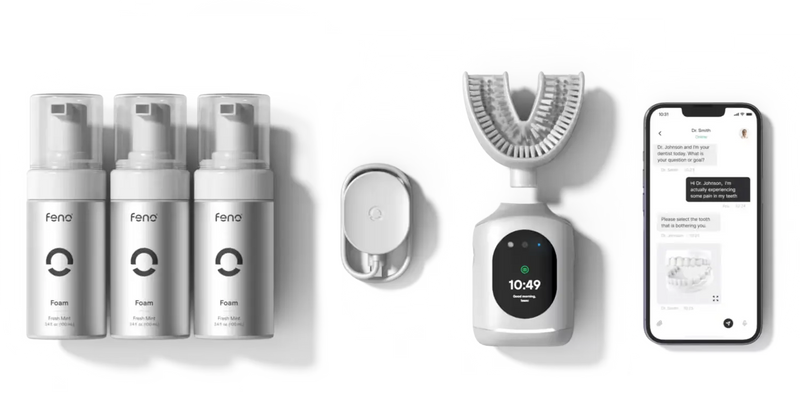
The Hidden Dangers of Mouth Breathing: A Scientific Deep Dive
Essential Takeaways
- Mouth breathing significantly reduces nitric oxide production, affecting cardiovascular and brain health
- Chronic mouth breathing disrupts oral pH balance and increases risk of dental problems
- Alcohol-based mouthwashes may compromise nitric oxide production and vascular health
- Nasal breathing is crucial for maintaining proper oral health and systemic wellness
- Simple lifestyle changes can help transition from mouth to nasal breathing
Recent research from Stanford neuroscientist Dr. Andrew Huberman has revealed a concerning connection between mouth breathing and overall health that extends far beyond mere comfort or habit. This discovery has significant implications for both oral and systemic health.
The Devastating Chain Reaction of Mouth Breathing
1. Oral Health Impact
Mouth breathing initiates several negative effects on oral health:
- Reduced Saliva Production: Studies show up to 60% decrease in protective saliva production during mouth breathing.
- pH Balance Disruption: "The shift from nasal to mouth breathing creates an immediate change in oral chemistry," explains Dr. Huberman, leading to increased acidity levels that can damage tooth enamel.
- Dental Complications: Research indicates a strong correlation between chronic mouth breathing and increased cavity formation, gum disease, and other dental issues.
2. The Nitric Oxide Factor
Dr. Huberman emphasizes: "Nitric oxide promotes vasodilation, not just within the blood vessels that line and feed the oral cavity, but also the throat, also in the nose, also in the brain, also in the heart." This crucial molecule affects:
- Cardiovascular Health: Proper nitric oxide levels support healthy blood pressure and circulation.
- Brain Function: Enhanced blood flow to the brain supports cognitive performance.
- Immune Response: Nitric oxide plays a vital role in immune system function.
3. Systemic Effects
Long-term mouth breathing can lead to:
- Altered facial development and structure.
- Compromised sleep quality.
- Increased risk of respiratory infections.
- Changes in posture and body alignment.

The Mouthwash Paradox
An unexpected finding relates to common oral care products. According to recent research:
- Alcohol-based mouthwashes can reduce nitric oxide production by up to 90%
- This reduction can last for several hours after use
- Alternative alcohol-free options may be more beneficial for oral health
Understanding the Mechanism
The Three Key Pathways:
1. Saliva Reduction Effects
- Compromised natural antimicrobial activity
- Reduced mineral availability for tooth protection
- Disrupted pH balance leading to increased decay risk
2. Vascular Impact
- Decreased nitric oxide synthesis
- Impaired blood vessel function
- Potential long-term cardiovascular effects
3. Systemic Consequences
- Cognitive performance changes
- Sleep quality impact
- Metabolic alterations
Long-Term Physical Effects
Research shows that chronic mouth breathing can lead to significant physical changes:
- Altered facial development in growing children
- Changes in dental alignment and bite patterns
- Increased risk of sleep-disordered breathing

The Solution: Embracing Nasal Breathing
Dr. Huberman's practical advice includes: "If you can be a nasal breather, be a nasal breather. As long as you're not speaking, as long as you're not eating, try and breathe through your nose."
Practical Implementation Steps:
- Start with daytime awareness
- Practice during rest periods
- Gradually extend to exercise
- Consider nighttime breathing patterns
FAQ
Q: How do I know if I'm a mouth breather?
A: Common signs include dry mouth upon waking, snoring, bad breath, frequent cavities, and daytime fatigue. A simple test is the lipstick test described by Dr. Huberman.
Q: Can mouth breathing cause anxiety?
A: Research indicates a strong correlation between mouth breathing and increased anxiety levels due to altered CO2 levels and nervous system activation.
Q: How long does it take to correct mouth breathing?
A: While individual results vary, studies show significant improvements in breathing patterns within 4-6 weeks of consistent practice and professional intervention.
Q: Does mouth breathing affect sleep quality?
A: Yes, research shows mouth breathing can significantly impact sleep quality by increasing sleep disruptions and reducing oxygen saturation during sleep.
*This blog is not an endorsement or affiliation with the Huberman Lab podcast. The content is for informational purposes only.
References:
- Lundberg, J. O., & Weitzberg, E. (2020). Nasal nitric oxide in man. Thorax, 54(10), 947-952.
- Huberman, A. Huberman Lab Podcast Episode: How to Improve Oral Health & Its Critical Role in Brain & Body Health
- Jefferson, Y. (2010). Mouth breathing: Adverse effects on facial growth, health, academics, and behavior. General Dentistry, 58(1), 18-25.
- PubMed - The physiology and pathophysiology of nitric oxide in the brain
- Dallam, G. M., et al. (2018). Effect of nasal versus oral breathing on Vo2max and physiological economy in recreational runners. International Journal of Kinesiology and Sports Science, 6(2), 22-29.
- PubMed - The effect of nitrate-rich supplementation on neuromuscular efficiency during heavy resistance exercise
- Medical News Today - Alcohol-based mouthwash may disrupt oral microbiome, leading to gum disease and certain cancers
- PubMed - Impact of airway dysfunction on dental health
- PubMed - The Effects of Volatile Salivary Acids and Bases on Exhaled Breath Condensate pH
- PubMed - The impact of mouth breathing on dentofacial development: A concise review
- PubMed - The role of nitric oxide in cardiovascular diseases

Feno Founders Edition Bundle
Advanced Oral Health in 20 Seconds with the Feno Smartbrush™
Get Yours Now!





